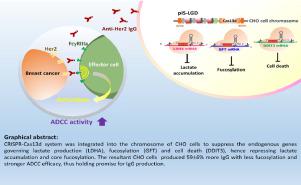Journal of the Taiwan Institute of Chemical Engineers ( IF 5.5 ) Pub Date : 2021-04-10 , DOI: 10.1016/j.jtice.2021.03.040 Mei-Wei Lin , Chih-Che Shen , Yen-Ju Lin , Min-Yuan Chou , Nam Ngoc Pham , Yi-Hao Chang , Chin-Wei Chang , Jih Ru Hwu , Mai Thanh Thi Nguyen , Yu-Chen Hu

|
Chinese hamster ovary (CHO) cell is the predominant cell factory to produce biopharmaceuticals such as immunoglobulin G (IgG), but in CHO cells lactate accumulation and cell death compromise IgG production while fucosylation mitigates the antibody-dependent cellular cytotoxicity (ADCC) of IgG. To tackle these problems, we harnessed a burgeoning gene silencing system, CRISPR-Cas13d, to effectively suppress the endogenous genes governing lactate production (LDHA), fucosylation (GFT) and cell death (DDIT3), hence repressing lactate accumulation and core fucosylation. We further exploited the Sleeping Beauty system to integrate the CRISPR-Cas13d module co-targeting these 3 genes and generated a CHO cell platform for IgG production. The new platform exhibited simultaneous knockdown of LDHA, GFT and DDIT3, accumulated less lactate, had prolonged longevity, produced 59 ± 6% more IgG with less fucosylation and stronger ADCC efficacy. These data collectively warrant the potentials of CRISPR-Cas13d for CHO cell engineering and improving antibody production with regard to quantity and quality.











































 京公网安备 11010802027423号
京公网安备 11010802027423号